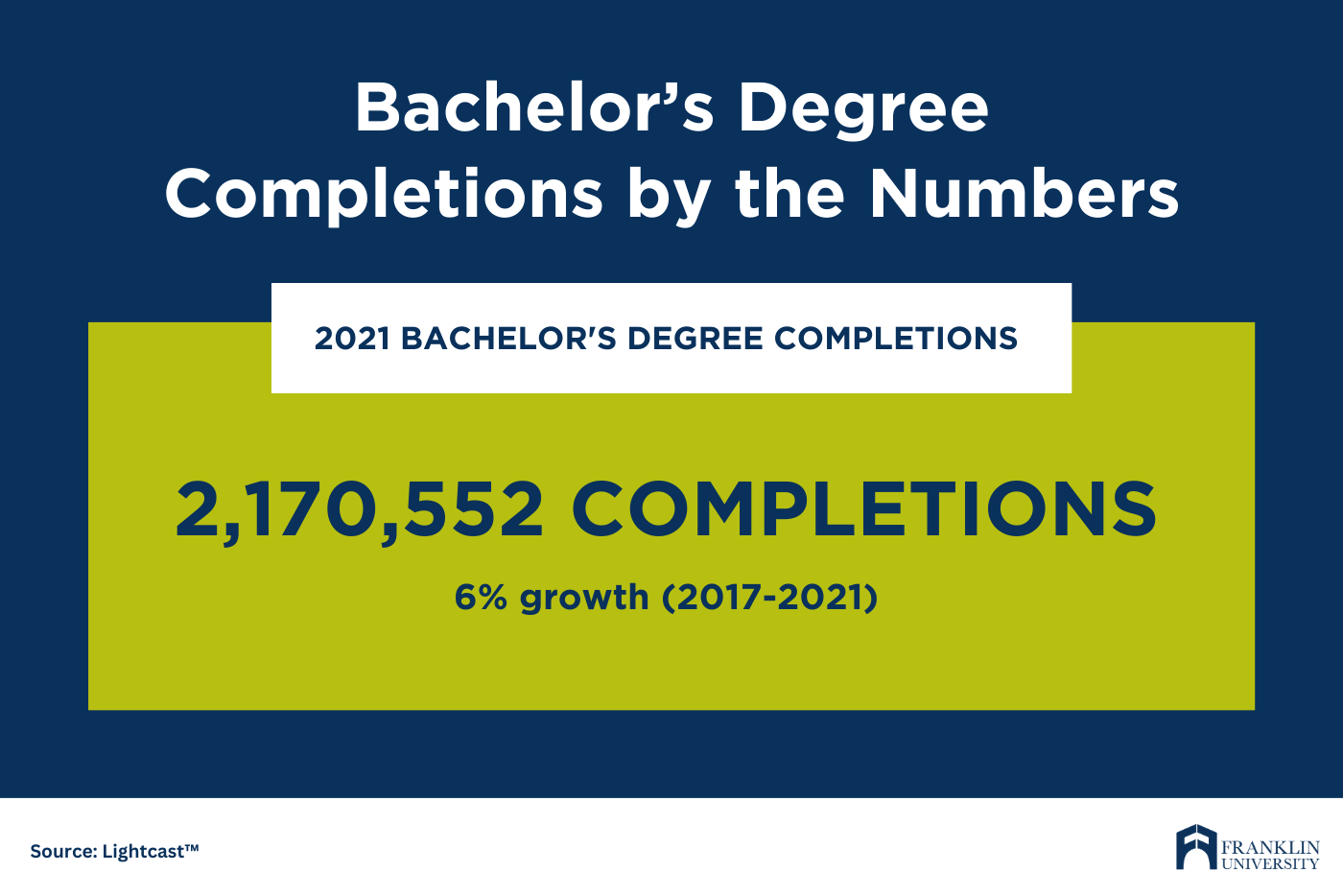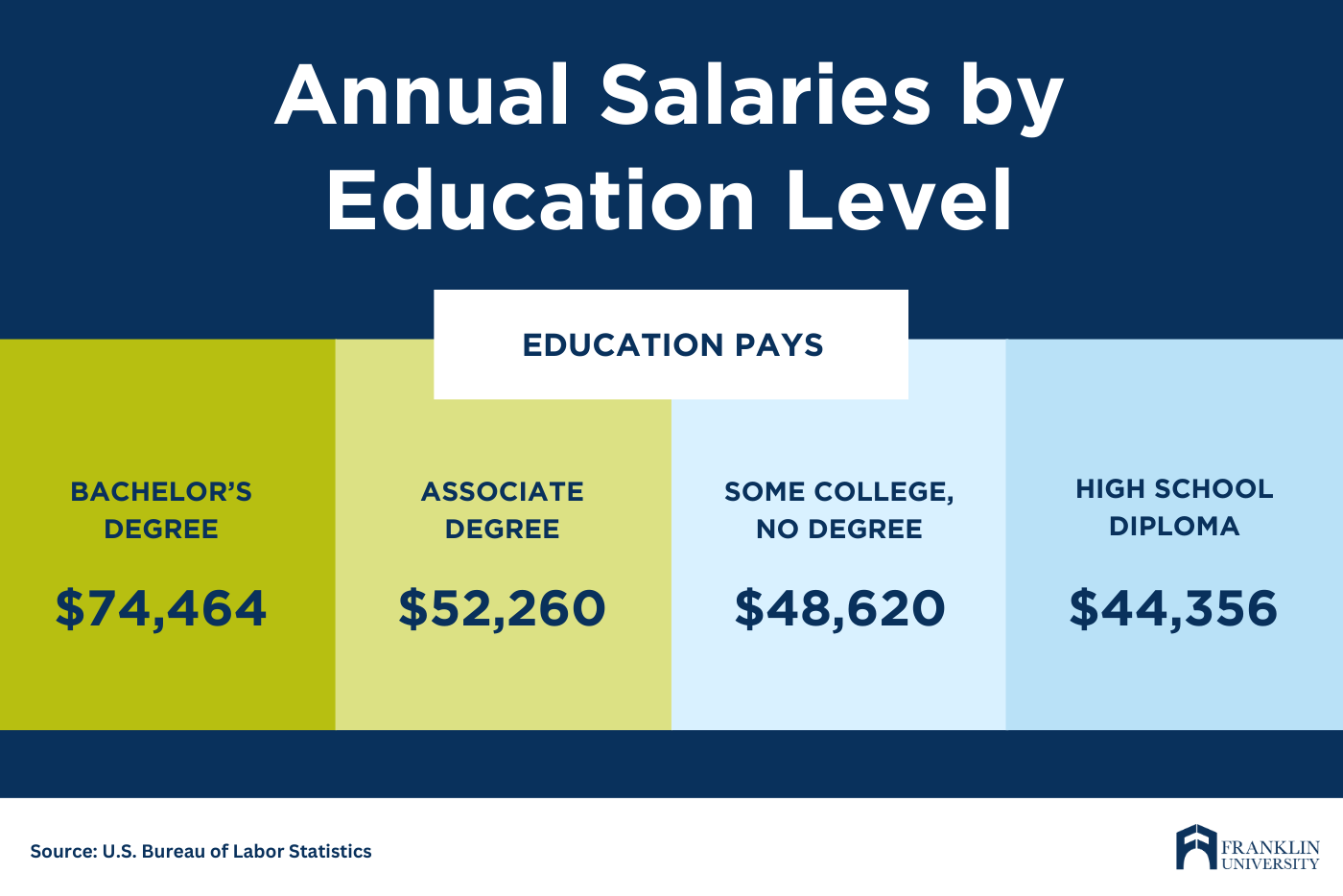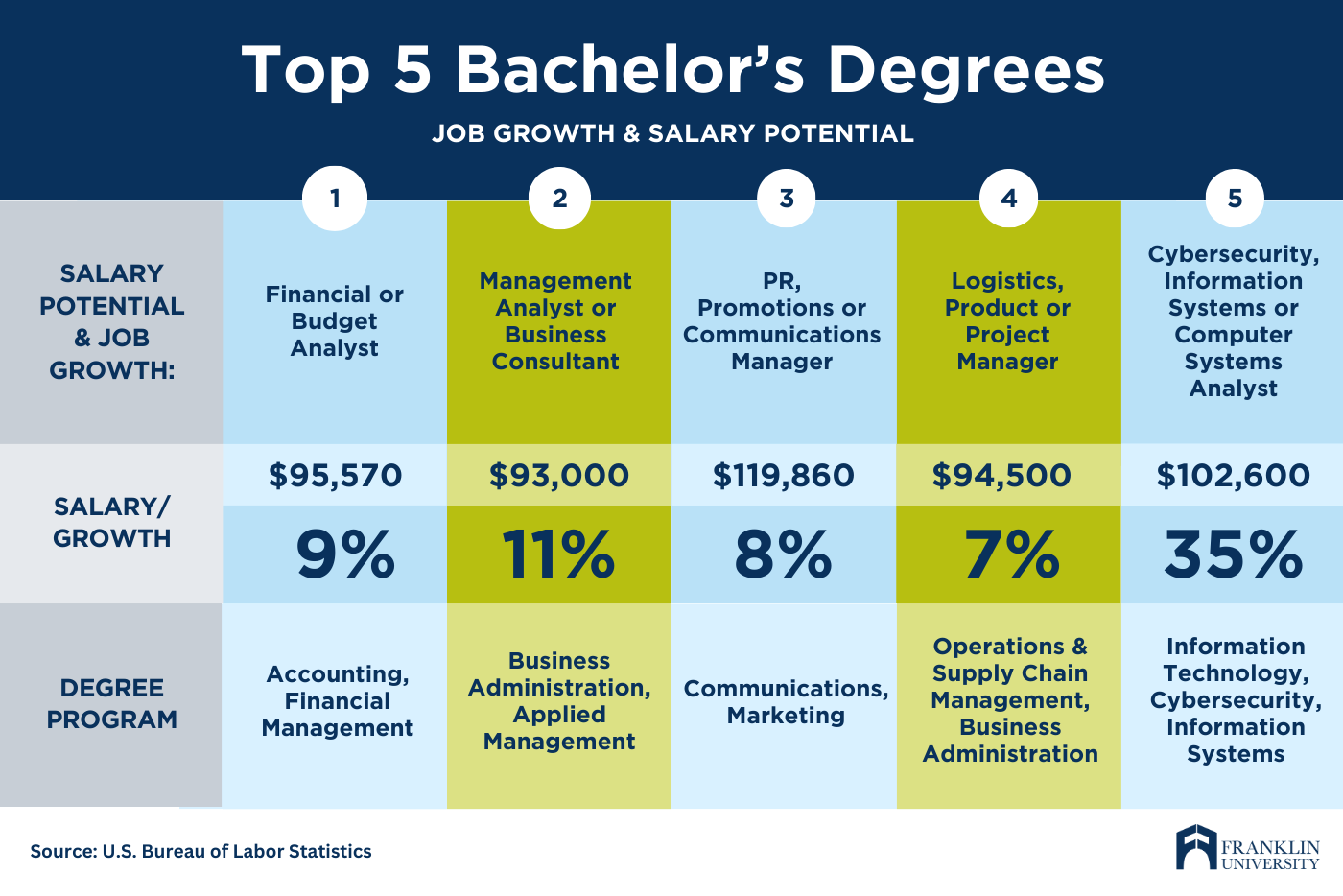Request Information
We're Sorry
There was an unexpected error with the form (your web browser was unable to retrieve some required data from our servers). This kind of error may occur if you have temporarily lost your internet connection. If you're able to verify that your internet connection is stable and the error persists, the Franklin University Help Desk is available to assist you at helpdesk@franklin.edu, 614.947.6682 (local), or 1.866.435.7006 (toll free).
Just a moment while we process your submission.

Is a Bachelor’s Degree Worth It? 6 Things To Consider
Whether you’re just starting your career, are in the middle of it or are looking for a new challenge, you face the same question: “Should I get my bachelor’s?”
It’s a big deal–and a big decision–that ultimately comes down to you knowing what you want.
Perhaps you’re a recent high school graduate or maybe you’re a busy, working adult. Either way, if you have a good job, you may think you don’t need to earn a bachelor’s degree.
But what if you could earn a bachelor’s degree and change the direction of your career–and your life? What if it’s time to rethink what a bachelor’s degree can do for you?
If you’re undecided about whether to earn a bachelor's degree, it can help to take an informed approach. First, consider how earning a bachelor’s degree could help your career and boost your earnings potential. Next, think about earning your bachelor’s in the context of your personal values and life circumstances. Finally, keep reading to learn more, including what a bachelor’s degree is, how long it takes to earn one and whether it’s worth the investment.
Why Should You Earn a Bachelor’s Degree?
There are plenty of reasons why people choose to earn their bachelor’s degree. For some, it’s a personal and professional achievement. For others, it’s an opportunity to grow in their knowledge and skills. For many, earning a bachelor’s degree is the first step toward transforming a job into a career.
Even if you aren’t yet convinced that a bachelor’s degree is right for you, keep in mind that it can be a great pathway to work that’s new and different or more challenging and exciting.
That would explain why more people than ever have earned their bachelor’s degree in the past few years. In fact, the number of bachelor’s degree completions has grown by 6% since 2017 and was up to 2.1 million in 2021, says labor market analytics firm Lightcast.

Bachelor’s Degree 101: What Is a Bachelor’s Degree?
Merriam-Webster defines a bachelor’s degree as: “a degree given to a student by a college or university usually after four years of study.”
For many, of course, it can take five, six, seven or more years to finish. The point is, a bachelor’s degree isn’t just a piece of paper that says you’ve completed a series of courses. And it isn’t something that’s given–you have to earn it. And that’s part of what makes it so valuable and worthwhile.
Keep in mind that a bachelor’s degree is a rigorous program of study designed to help you learn new things, grow in your expertise and acquire the critical skills you need to succeed in your career.
When it comes to paying for school, grants are among your best options. But do you know how to find them? Remove the guesswork by downloading this free guide
How Many College Credits Does It Take for a Bachelor’s Degree?
A typical bachelor’s degree program on a semester calendar requires around 120 credit hours to graduate. But that’s not a hard-and-fast rule. That’s because how fast you can finish depends on a number of factors, ranging from the school to the degree program to whether you’re eligible for transfer credit to how many courses you’re able to complete each academic period.
For example, an institutionally accredited university is required to conform to a commonly accepted minimum program length as defined by its accrediting body. The school itself may have credit requirements, too.
Regardless of how many college credits it takes to earn your bachelor’s, you can expect a high-quality bachelor’s degree program to require completion of both foundational and academic major coursework.
How Long Does It Take to Earn a Bachelor’s?
According to the U.S. Department of Education, a bachelor’s degree is the most common first degree and can be finished in as few as four academic years. However, at a school with a generous transfer policy, you could finish even faster.
6 Big Benefits of a Bachelor’s Degree
There are a lot of good reasons, both personal and professional, to earn a bachelor’s degree. It’s one of the most powerful ways to transform your work, boost your confidence, and improve your earnings potential, job stability and job satisfaction..
Here’s a look at six major benefits of earning a bachelor’s degree, including what you could expect when you graduate.
1. Salary
According to both the U.S. Bureau of Labor Statistics (BLS) and the National Center for Education Statistics (NCES), education pays.
NCES states that those with a bachelor’s degree earn more than those with an associate degree or only a high school diploma. Specifically, the BLS says that the average annual salary for those with a bachelor’s degree is $74,464. That’s a big difference when compared to $52,260 for an associate degree, $48,620 for some college, no degree and $44,356 for a high school diploma.

2. Job Opportunities
The electronic age drastically changed the way employers attracted and hired top talent. Gone are the stacks of paper resumes poured over by someone in HR. Today, most of the legwork for hiring is computerized with electronic resumes and software-scanned resumes that weed out the keywords that don’t match the job description.
“So, if your resume doesn’t have ‘bachelor’s degree’ highlighted,” says Dr. Doug Ross, program chair for business administration at Franklin University, “but a hundred other candidates do, where do you think your resume will end up? Having that credential on your resume is critical if you want to stand out from others and get a career job in your field.”
The truth is, employers and recruiters are in need of people who have a bachelor’s degree. According to Lightcast there are more than 4.16 million annual job openings for those seeking candidates with a bachelor’s degree. Lightcast also reports an anticipated 12.2% increase in openings for occupations requiring a bachelor’s degree, so the need is there and will continue to be so.
3. New career
A change in career when you're older can be both exciting and challenging. Take career military veterans, for example. Many retire from the military but aren’t ready to stop working. Because military skill sets don't always translate into civilian life, returning to college can be the perfect kick-start to drive a late-stage career change.
"The best scenario for success," says Dr. Ross, "is when you get your bachelor's degree in order to support your passion. Perhaps for the past 10 years, you've done work in business administration, but you've always wanted to be a nurse like your mom. You have a working knowledge of what the job takes. You know the ups and downs and are familiar with the setting. A bachelor’s degree can help you get there."
4. Personal and Professional Growth
According to the Pew Research Center, highly educated employees are more likely to be satisfied with their personal life and more professionally fulfilled.
Pew found that 75% of bachelor’s degree holders agreed that they’re “very satisfied” with their family lives, compared to 71% of all Americans and 64% for those with less than a high school education who say the same.
As for professional satisfaction, well-educated respondents were more likely than twice as likely to describe their job as a career. For bachelor’s degree holders, 60% reported that their career gives them a sense of identity and 68% say it gives them a sense of job security.
Keep in mind that many people choose to earn a bachelor’s simply for personal enrichment. Going back to college to get your bachelor’s gives you a unique opportunity to dive deeply into a subject that's extremely interesting to you as an individual. From a personal-development standpoint, a bachelor’s degree program can increase your critical-thinking and decision-making capabilities in a way that enriches all other areas of life, not just your career.
5. Lower Unemployment
Job growth, salary, flexibility and stability are more important than ever in the post-pandemic workplace.
Data from the BLS data shows that more education means less likelihood for unemployment.
The unemployment rate is highest for high school graduates at 4%, with those with an associate’s degree coming in just behind at 2.7%. As for college graduates with a bachelor’s degree, the unemployment rate is almost half of high school grads at just 2.2%.
6. More Flexibility
Perhaps you, like many others, are looking for a bachelor's degree to enable more freedom in your life. Whether that means landing a job with a predictable 9-to-5 workday or a flexible job not tied to a time or place, the result is the same: more control of your schedule to make time for what matters most to you.
Top 5 Bachelor’s Degrees for Job Growth and Salary Potential
Whether you’re looking to start or change your career, a bachelor’s degree can help you do it. One of the best things about a bachelor’s degree is that it can open up a wide variety of career paths ranging from business to marketing to technology.
Here’s a look at five of the most popular jobs for those with a bachelor’s degree.

1. Financial or Budget Analyst
Analysts identify financial or economic trends to make forecasts and support decision making.
Annual Median Salary:$95,570
Job Outlook to 2031: 9%
Best Bachelor’s Degrees:B.S. Accounting, B.S. Financial Management
2. Management Analyst or Business Consultant
Analysts and consultants assess needs, determine requirements and make recommendations for improvements to increase profitability.
Annual Median Salary:$93,000
Job Outlook to 2031: 11%
Best Bachelor’s Degrees:B.S. Business Administration, B.S. Applied Management
3. Public Relations, Promotions or Communications Manager
PR and communications managers collaborate in planning, creating, and delivering materials to communicate relevant information or enhance an organization’s image.
Annual Median Salary: $119,860
Job Outlook to 2031: 8%
Best Bachelor’s Degrees:B.S. Communications, B.S. Marketing
4. Logistics, Product or Project Manager
These managers plan, implement and manage strategies to ensure cost-effective and efficient delivery of goods and services.
Annual Median Salary:$94,500
Job Outlook to 2031: 7%
Best Bachelor’s Degrees:B.S. Operations & Supply Chain Management, B.S. Business Administration
5. Cybersecurity, Information Systems or Computer Systems Analyst
These analysts plan, implement and monitor systems and networks for security breaches and develop mitigation and best practice strategies.
Annual Median Salary: $102,600
Job Outlook to 2031: 35%
Best Bachelor’s Degrees:B.S. Information Technology, B.S. Cybersecurity, B.S. Information Systems
5 Bachelor’s Degree Alternatives
Of course, not everyone wants or needs to earn a bachelor’s degree. So, here’s a look at six alternatives to a bachelor’s degree that also can elevate your level of satisfaction with your job and your life.
1. Associate Degree
A career-focused associate degree only takes about two years to complete. That means you can build a solid foundation of skills to help fast-track your career. Depending on your school, you could transition to a bachelor’s degree program with the help of transfer credits. Plus, research shows that an associate degree can help boost your earnings.
2. Professional Certificate
If staying current in your field is most important to you or you’re just looking to try something new, then perhaps you’ll want to earn a specialized credential through an online certificate program. Not only do for-credit certificates introduce you to new concepts and theories in a particular field, they can help you move ahead in your career without committing to long-term study.
3. Internship or Apprenticeship
Internships and apprenticeships have long been an important part of education, especially for certain skills and career paths. With an internship or apprenticeship, you’ll learn valuable skills on the job and get to apply those skills in real time–and you might even receive some type of classroom instruction, too. Keep in mind that you may or may not be able to secure a paid internship or apprenticeship. Either way, it can be a great opportunity to learn a new skill and make valuable professional connections.
4. Entrepreneurship
There are plenty of business success stories of people who’ve launched their own company (or empire) without having a college degree. While there are plenty of good reasons to earn a degree so that you’re better equipped to run your own business, it’s quite possible to start a business without a college degree. Check with a government agency like the Small Business Administration (SBA) for support, information and resources to get started.
5. Military or Law Enforcement
You can decide to pursue a college education before, during or after a career in military or law enforcement or you can go straight into service. Either way, these careers are not only dynamic and in-demand, they’re also a great way to develop transferable skills and qualities, including leadership, problem-solving and discipline. In addition, military veterans may be eligible for educational benefits that can make going back to college after a service career more affordable.
Is a Bachelor’s Degree Right for Me?
It’s obvious that there are plenty of good reasons to get a bachelor’s degree–especially if you want to move ahead in your career or start a new one.
Of course, only you can decide if a bachelor’s is worth it to YOU.
Here are a few questions to keep in mind as you make your decision:
- How will your bachelor’s degree help or change your career path?
- How much more will your salary be with a bachelor’s degree?
- How quickly can you reach that earning potential?
Finally, remember that expanding your knowledge base and improving your skill set is something that can help you grow personally and professionally, as well as make you more marketable and competitive in the work world.





